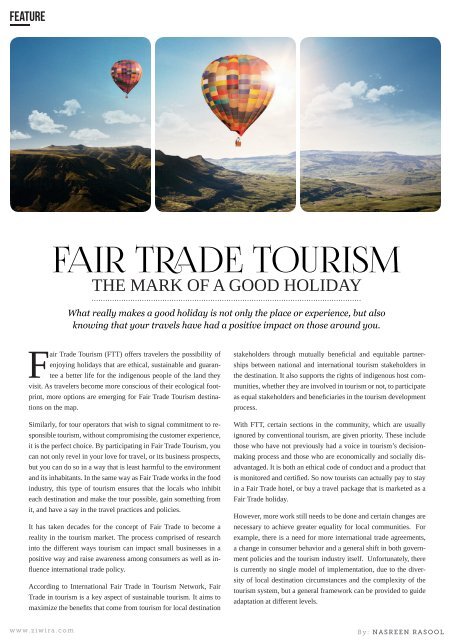Ziwira Travel August
- No tags were found...
You also want an ePaper? Increase the reach of your titles
YUMPU automatically turns print PDFs into web optimized ePapers that Google loves.
FeatureFair trade TourismThe mark of a good holidayWhat really makes a good holiday is not only the place or experience, but alsoknowing that your travels have had a positive impact on those around you.Fair Trade Tourism (FTT) offers travelers the possibility ofenjoying holidays that are ethical, sustainable and guaranteea better life for the indigenous people of the land theyvisit. As travelers become more conscious of their ecological footprint,more options are emerging for Fair Trade Tourism destinationson the map.Similarly, for tour operators that wish to signal commitment to responsibletourism, without compromising the customer experience,it is the perfect choice. By participating in Fair Trade Tourism, youcan not only revel in your love for travel, or its business prospects,but you can do so in a way that is least harmful to the environmentand its inhabitants. In the same way as Fair Trade works in the foodindustry, this type of tourism ensures that the locals who inhibiteach destination and make the tour possible, gain something fromit, and have a say in the travel practices and policies.It has taken decades for the concept of Fair Trade to become areality in the tourism market. The process comprised of researchinto the different ways tourism can impact small businesses in apositive way and raise awareness among consumers as well as influenceinternational trade policy.According to International Fair Trade in Tourism Network, FairTrade in tourism is a key aspect of sustainable tourism. It aims tomaximize the benefits that come from tourism for local destinationstakeholders through mutually beneficial and equitable partnershipsbetween national and international tourism stakeholders inthe destination. It also supports the rights of indigenous host communities,whether they are involved in tourism or not, to participateas equal stakeholders and beneficiaries in the tourism developmentprocess.With FTT, certain sections in the community, which are usuallyignored by conventional tourism, are given priority. These includethose who have not previously had a voice in tourism’s decisionmakingprocess and those who are economically and socially disadvantaged.It is both an ethical code of conduct and a product thatis monitored and certified. So now tourists can actually pay to stayin a Fair Trade hotel, or buy a travel package that is marketed as aFair Trade holiday.However, more work still needs to be done and certain changes arenecessary to achieve greater equality for local communities. Forexample, there is a need for more international trade agreements,a change in consumer behavior and a general shift in both governmentpolicies and the tourism industry itself. Unfortunately, thereis currently no single model of implementation, due to the diversityof local destination circumstances and the complexity of thetourism system, but a general framework can be provided to guideadaptation at different levels.www.ziwira.comBy: NASREEN RASOOL






